By Johannes Grow · Tuesday, November 19, 2013 As an occasional feature on TELOSscope, we highlight a past Telos article whose critical insights continue to illuminate our thinking and challenge our assumptions. Today, Johannes Grow looks at Russell A. Berman’s “Saddam and Hitler: Rethinking Totalitarianism” from Telos 125 (Fall 2002).
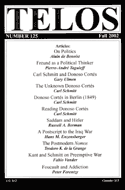 In “Saddam and Hitler: Rethinking Totalitarianism,” Russell A. Berman examines the limits of current efforts to understand totalitarianism in light of the juxtaposition of Nazi Germany and Baathist Iraq. He questions the “cultural approaches” often implemented when approaching the study of the Nazi years. Berman doubts whether the German people, under the increasingly violent and fanatical Nazi regime, were truly a Volksgemeinschaft, a happy population believing in every word of the leader, be it true or false, or as the Baathist regime in Iraq demonstrated, a regime of violence, with the party and the leader as the center node propagating terror throughout the state. The author examines three problems present in contemporary discussions of the Nazi regime that may be further elucidated through a juxtaposition of Hitler’s “movement” with the old Saddam regime. The first involves the futility of defining these regimes as either “Left” or “Right.” These types of distinctions do not allow for a full exploration of the effects of these regimes. The second problem is the aligning of Nazism with a sort of “cultural hegemony” rather than with an environment of coercion, violence, and politics. The third concern involves limiting the question of totalitarianism to a certain period history rather than examining its effects on the present. In “Saddam and Hitler: Rethinking Totalitarianism,” Russell A. Berman examines the limits of current efforts to understand totalitarianism in light of the juxtaposition of Nazi Germany and Baathist Iraq. He questions the “cultural approaches” often implemented when approaching the study of the Nazi years. Berman doubts whether the German people, under the increasingly violent and fanatical Nazi regime, were truly a Volksgemeinschaft, a happy population believing in every word of the leader, be it true or false, or as the Baathist regime in Iraq demonstrated, a regime of violence, with the party and the leader as the center node propagating terror throughout the state. The author examines three problems present in contemporary discussions of the Nazi regime that may be further elucidated through a juxtaposition of Hitler’s “movement” with the old Saddam regime. The first involves the futility of defining these regimes as either “Left” or “Right.” These types of distinctions do not allow for a full exploration of the effects of these regimes. The second problem is the aligning of Nazism with a sort of “cultural hegemony” rather than with an environment of coercion, violence, and politics. The third concern involves limiting the question of totalitarianism to a certain period history rather than examining its effects on the present.
Continue reading →
By Johanna K. Schenner · Thursday, October 31, 2013 As an occasional feature on TELOSscope, we highlight a past Telos article whose critical insights continue to illuminate our thinking and challenge our assumptions. Today, Johanna Schenner looks at Simon Clarke’s “The Crisis of Fordism or the Crisis of Social Democracy?” from Telos 83 (Spring 1990).
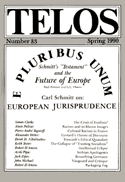 Simon Clarke’s “The Crisis of Fordism or the Crisis of Social Democracy?” deals with the need to develop different economic strategies as the interventionist welfare state underwent many challenges and crises in the 1980s. The crumbling of communism further supported the idea that weak state interventionism often could not reach its stipulated economic goals. In comparison to the socialist critique of the state, the political right put forward measures and tools such as privatization to support its critique of the state by the following means: first, by focusing on the selective redistribution of income; and second, by bringing about a particular kind of Keynesian economic policy featuring military characteristics (73). The economic growth came to an end in 1987 when a global panic about the massive credit boom begun under Reagan and Thatcher broke wide open. Still, the right’s policies reached a new height with the waves of radical liberalization in the former communist countries as well as in the Third World. Clarke, however, expresses severe doubts about this strategy being the solution to neoliberalism’s economic strategy crisis (79). Simon Clarke’s “The Crisis of Fordism or the Crisis of Social Democracy?” deals with the need to develop different economic strategies as the interventionist welfare state underwent many challenges and crises in the 1980s. The crumbling of communism further supported the idea that weak state interventionism often could not reach its stipulated economic goals. In comparison to the socialist critique of the state, the political right put forward measures and tools such as privatization to support its critique of the state by the following means: first, by focusing on the selective redistribution of income; and second, by bringing about a particular kind of Keynesian economic policy featuring military characteristics (73). The economic growth came to an end in 1987 when a global panic about the massive credit boom begun under Reagan and Thatcher broke wide open. Still, the right’s policies reached a new height with the waves of radical liberalization in the former communist countries as well as in the Third World. Clarke, however, expresses severe doubts about this strategy being the solution to neoliberalism’s economic strategy crisis (79).
Continue reading →
By Maja Sidzinska · Thursday, October 17, 2013 As an occasional feature on TELOSscope, we highlight a past Telos article whose critical insights continue to illuminate our thinking and challenge our assumptions. Today, Maja Sidzinska looks at James Kalb’s “Understanding Conservatism and Tradition,” from Telos 124 (Summer 2002).
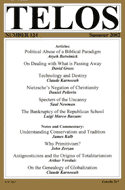 Let’s start with the punch-line: James Kalb informs us, in his article “Understanding Conservatism and Tradition,” that “the modern emphasis is too much on technology, on breaking things down to their simplest parts and reconstructing them in accord with human will. The problem with applying that approach to human life as a whole is that one can make sense of one’s actions only by reference to standards and realities one does not create” (164). In Kalb’s view, tradition creates these standards and realities, and is irreplaceable in this role. He compares the role of tradition to the roles of bureaucracy and markets, and he holds these three operative approaches as constitutive of politics, public policy, and life more generally. Let’s start with the punch-line: James Kalb informs us, in his article “Understanding Conservatism and Tradition,” that “the modern emphasis is too much on technology, on breaking things down to their simplest parts and reconstructing them in accord with human will. The problem with applying that approach to human life as a whole is that one can make sense of one’s actions only by reference to standards and realities one does not create” (164). In Kalb’s view, tradition creates these standards and realities, and is irreplaceable in this role. He compares the role of tradition to the roles of bureaucracy and markets, and he holds these three operative approaches as constitutive of politics, public policy, and life more generally.
Continue reading →
By Johanna K. Schenner · Tuesday, October 8, 2013 As an occasional feature on TELOSscope, we highlight a past Telos article whose critical insights continue to illuminate our thinking and challenge our assumptions. Today, Johanna Schenner looks at Alain de Benoist’s “The End of the Left-Right Dichotomy: The French Case,” from Telos 102 (Winter 1995).
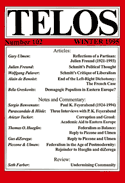 In his article “The End of the Left-Right Dichotomy: The French Case,” Alain de Benoist points to the gradual disappearance of traditional political ideologies in both socialist and conservative parties. In fact, Sofres Polls support this statement: in March 1981, 33% of the population viewed this delineation as outdated; in February 1986, 45% of the population shared this view; in March 1988, this proportion reached a new record level of 48%; and eventually in November 1989, more than half of the French population deemed this ideological antagonism as obsolete (73). In his article “The End of the Left-Right Dichotomy: The French Case,” Alain de Benoist points to the gradual disappearance of traditional political ideologies in both socialist and conservative parties. In fact, Sofres Polls support this statement: in March 1981, 33% of the population viewed this delineation as outdated; in February 1986, 45% of the population shared this view; in March 1988, this proportion reached a new record level of 48%; and eventually in November 1989, more than half of the French population deemed this ideological antagonism as obsolete (73).
Continue reading →
By Linas Jokubaitis · Thursday, September 26, 2013 As an occasional feature on TELOSscope, we highlight a past Telos article whose critical insights continue to illuminate our thinking and challenge our assumptions. Today, Linas Jokubaitis looks at Paul Piccone’s “Lukács’s History and Class Consciousness Half a Century Later,” from Telos 4 (Fall 1969).
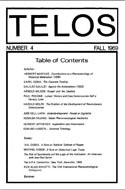 In 1969, when Paul Piccone wrote “Lukács’s History and Class Consciousness Half a Century Later,” almost fifty years had passed since the publication of Georg Lukács’s magnum opus. Piccone wrote this essay to mark that anniversary, and he argued that this work was an “underground classic.” Moreover, he asserted that this book was essential for any analysis of modern thought. According to Piccone, everyone attempting to understand and overcome the ideological crisis of Marxism would be wise to consult this book. In 1969, when Paul Piccone wrote “Lukács’s History and Class Consciousness Half a Century Later,” almost fifty years had passed since the publication of Georg Lukács’s magnum opus. Piccone wrote this essay to mark that anniversary, and he argued that this work was an “underground classic.” Moreover, he asserted that this book was essential for any analysis of modern thought. According to Piccone, everyone attempting to understand and overcome the ideological crisis of Marxism would be wise to consult this book.
Continue reading →
By Beau Mullen · Tuesday, September 10, 2013 As an occasional feature on TELOSscope, we highlight a past Telos article whose critical insights continue to illuminate our thinking and challenge our assumptions. Today, Beau Mullen looks at Alain de Benoist’s “The Idea of Empire,” from Telos 98–99 (Winter 1993/Spring 1994).
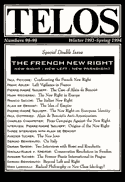 Few political concepts have appeared as destined to be cast into history’s dustbin as that of empire. The nation-state is the most widely accepted model for sovereign territories, and imperial ambitions of nations are often condemned by the international community. The existence of great empires, such as that of the Romans or of the Holy Roman Empire, it appears, are simply regimes that are relics of a distant, less enlightened historical era. The areas once encompassing the great empires have now fractured into sovereign nation-states, each with its own polity and allegiances. Furthermore, serious modern confederation between nations is most often based on monetary concerns, not the furtherance of any imperial goal or ambition. The sun, it could be said, has set on the idea of empire. Few political concepts have appeared as destined to be cast into history’s dustbin as that of empire. The nation-state is the most widely accepted model for sovereign territories, and imperial ambitions of nations are often condemned by the international community. The existence of great empires, such as that of the Romans or of the Holy Roman Empire, it appears, are simply regimes that are relics of a distant, less enlightened historical era. The areas once encompassing the great empires have now fractured into sovereign nation-states, each with its own polity and allegiances. Furthermore, serious modern confederation between nations is most often based on monetary concerns, not the furtherance of any imperial goal or ambition. The sun, it could be said, has set on the idea of empire.
Continue reading →
|
|
 In “Saddam and Hitler: Rethinking Totalitarianism,” Russell A. Berman examines the limits of current efforts to understand totalitarianism in light of the juxtaposition of Nazi Germany and Baathist Iraq. He questions the “cultural approaches” often implemented when approaching the study of the Nazi years. Berman doubts whether the German people, under the increasingly violent and fanatical Nazi regime, were truly a Volksgemeinschaft, a happy population believing in every word of the leader, be it true or false, or as the Baathist regime in Iraq demonstrated, a regime of violence, with the party and the leader as the center node propagating terror throughout the state. The author examines three problems present in contemporary discussions of the Nazi regime that may be further elucidated through a juxtaposition of Hitler’s “movement” with the old Saddam regime. The first involves the futility of defining these regimes as either “Left” or “Right.” These types of distinctions do not allow for a full exploration of the effects of these regimes. The second problem is the aligning of Nazism with a sort of “cultural hegemony” rather than with an environment of coercion, violence, and politics. The third concern involves limiting the question of totalitarianism to a certain period history rather than examining its effects on the present.
In “Saddam and Hitler: Rethinking Totalitarianism,” Russell A. Berman examines the limits of current efforts to understand totalitarianism in light of the juxtaposition of Nazi Germany and Baathist Iraq. He questions the “cultural approaches” often implemented when approaching the study of the Nazi years. Berman doubts whether the German people, under the increasingly violent and fanatical Nazi regime, were truly a Volksgemeinschaft, a happy population believing in every word of the leader, be it true or false, or as the Baathist regime in Iraq demonstrated, a regime of violence, with the party and the leader as the center node propagating terror throughout the state. The author examines three problems present in contemporary discussions of the Nazi regime that may be further elucidated through a juxtaposition of Hitler’s “movement” with the old Saddam regime. The first involves the futility of defining these regimes as either “Left” or “Right.” These types of distinctions do not allow for a full exploration of the effects of these regimes. The second problem is the aligning of Nazism with a sort of “cultural hegemony” rather than with an environment of coercion, violence, and politics. The third concern involves limiting the question of totalitarianism to a certain period history rather than examining its effects on the present.  Simon Clarke’s “The Crisis of Fordism or the Crisis of Social Democracy?” deals with the need to develop different economic strategies as the interventionist welfare state underwent many challenges and crises in the 1980s. The crumbling of communism further supported the idea that weak state interventionism often could not reach its stipulated economic goals. In comparison to the socialist critique of the state, the political right put forward measures and tools such as privatization to support its critique of the state by the following means: first, by focusing on the selective redistribution of income; and second, by bringing about a particular kind of Keynesian economic policy featuring military characteristics (73). The economic growth came to an end in 1987 when a global panic about the massive credit boom begun under Reagan and Thatcher broke wide open. Still, the right’s policies reached a new height with the waves of radical liberalization in the former communist countries as well as in the Third World. Clarke, however, expresses severe doubts about this strategy being the solution to neoliberalism’s economic strategy crisis (79).
Simon Clarke’s “The Crisis of Fordism or the Crisis of Social Democracy?” deals with the need to develop different economic strategies as the interventionist welfare state underwent many challenges and crises in the 1980s. The crumbling of communism further supported the idea that weak state interventionism often could not reach its stipulated economic goals. In comparison to the socialist critique of the state, the political right put forward measures and tools such as privatization to support its critique of the state by the following means: first, by focusing on the selective redistribution of income; and second, by bringing about a particular kind of Keynesian economic policy featuring military characteristics (73). The economic growth came to an end in 1987 when a global panic about the massive credit boom begun under Reagan and Thatcher broke wide open. Still, the right’s policies reached a new height with the waves of radical liberalization in the former communist countries as well as in the Third World. Clarke, however, expresses severe doubts about this strategy being the solution to neoliberalism’s economic strategy crisis (79).  Let’s start with the punch-line: James Kalb informs us, in his article “Understanding Conservatism and Tradition,” that “the modern emphasis is too much on technology, on breaking things down to their simplest parts and reconstructing them in accord with human will. The problem with applying that approach to human life as a whole is that one can make sense of one’s actions only by reference to standards and realities one does not create” (164). In Kalb’s view, tradition creates these standards and realities, and is irreplaceable in this role. He compares the role of tradition to the roles of bureaucracy and markets, and he holds these three operative approaches as constitutive of politics, public policy, and life more generally.
Let’s start with the punch-line: James Kalb informs us, in his article “Understanding Conservatism and Tradition,” that “the modern emphasis is too much on technology, on breaking things down to their simplest parts and reconstructing them in accord with human will. The problem with applying that approach to human life as a whole is that one can make sense of one’s actions only by reference to standards and realities one does not create” (164). In Kalb’s view, tradition creates these standards and realities, and is irreplaceable in this role. He compares the role of tradition to the roles of bureaucracy and markets, and he holds these three operative approaches as constitutive of politics, public policy, and life more generally.  In his article
In his article  In 1969, when Paul Piccone wrote “Lukács’s History and Class Consciousness Half a Century Later,” almost fifty years had passed since the publication of Georg Lukács’s magnum opus. Piccone wrote this essay to mark that anniversary, and he argued that this work was an “underground classic.” Moreover, he asserted that this book was essential for any analysis of modern thought. According to Piccone, everyone attempting to understand and overcome the ideological crisis of Marxism would be wise to consult this book.
In 1969, when Paul Piccone wrote “Lukács’s History and Class Consciousness Half a Century Later,” almost fifty years had passed since the publication of Georg Lukács’s magnum opus. Piccone wrote this essay to mark that anniversary, and he argued that this work was an “underground classic.” Moreover, he asserted that this book was essential for any analysis of modern thought. According to Piccone, everyone attempting to understand and overcome the ideological crisis of Marxism would be wise to consult this book.  Few political concepts have appeared as destined to be cast into history’s dustbin as that of empire. The nation-state is the most widely accepted model for sovereign territories, and imperial ambitions of nations are often condemned by the international community. The existence of great empires, such as that of the Romans or of the Holy Roman Empire, it appears, are simply regimes that are relics of a distant, less enlightened historical era. The areas once encompassing the great empires have now fractured into sovereign nation-states, each with its own polity and allegiances. Furthermore, serious modern confederation between nations is most often based on monetary concerns, not the furtherance of any imperial goal or ambition. The sun, it could be said, has set on the idea of empire.
Few political concepts have appeared as destined to be cast into history’s dustbin as that of empire. The nation-state is the most widely accepted model for sovereign territories, and imperial ambitions of nations are often condemned by the international community. The existence of great empires, such as that of the Romans or of the Holy Roman Empire, it appears, are simply regimes that are relics of a distant, less enlightened historical era. The areas once encompassing the great empires have now fractured into sovereign nation-states, each with its own polity and allegiances. Furthermore, serious modern confederation between nations is most often based on monetary concerns, not the furtherance of any imperial goal or ambition. The sun, it could be said, has set on the idea of empire. 

